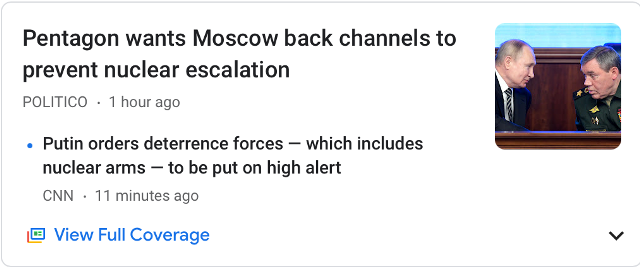File:Nukes put on high alert.png
Nukes_put_on_high_alert.png (640 × 267 pixels, file size: 85 KB, MIME type: image/png)
February 28
Washington Post | Opinion: Putin’s nuclear threats remind us arms control is dangerously unfinished business
Lost opportunity for nuclear arms control agreements and 'mutual security'
Sunday, February 27, 2022
Nuclear Alert Status
Amid escalating war in Ukraine, Russia's President Putin is reported as ordering nuclear weapons placed on "high alert".
The world must now hope there is no accidental use, or preemptive tactical use, or mistake/miscalculation, or other irrational order in a chain of potentially cataclysmic command decisions.
We are also witnessing the collapse of nuclear arms control agreements of the past, the architecture built with great effort to limit nuclear weapons proliferation and deliver a semblance of security to nations across the world.
These are lost opportunities and fateful portents that act to set back mutual security. A new Cold War 2.0 is gathering force and momentum, becoming a nuclear era, a nuclear breakout that is extremely dangerous.
(Associated Press) Reporting from KYIV, Ukraine: In a dramatic escalation of East-West tensions over Russia’s invasion of Ukraine, President Vladimir Putin ordered Russian nuclear forces put on high alert Sunday in response to what he called “aggressive statements” by leading NATO powers.
The directive to put Russia’s nuclear weapons in an increased state of readiness for launch raised fears that the crisis could boil over into nuclear warfare, whether by design or mistake.
Putin’s step is “potentially putting in play forces that, if there’s a miscalculation, could make things much, much more dangerous,” said a senior U.S. defense official, speaking on condition of anonymity.
Daryl Kimball, executive director of the Arms Control Association, said Putin’s order to put his nuclear forces on higher alert was regrettable but not a complete surprise given his previous implied threats against any nation that tried to stop him in Ukraine.
“Inserting nuclear weapons into the Ukraine war equation at this point is extremely dangerous, and the United States, President Biden, and NATO must act with extreme restraint” and not respond in kind, Kimball said. “This is a very dangerous moment in this crisis, and we need to urge our leaders to walk back from the nuclear brink.”
(POLITICO)
Feb. 27, Reporting from Washington DC: '“Now that Ukrainian airspace is in dispute and being contested and Ukrainian airspace runs right up alongside NATO airspace, we have conveyed to the Russians that we believe a conduit at the operational level is needed … so we can avoid miscalculation,” a senior Pentagon official told POLITICO. “And we have not received any response from them in terms of whether they agree, whether they are willing to set something up.”
(CNN)
Feb. 27, Reporting from Moscow: Russian President Vladimir Putin has ordered his country’s deterrence forces – which includes nuclear arms – be placed on high alert.
“Top officials in leading NATO countries have allowed themselves to make aggressive comments about our country, therefore I hereby order the minister of Defense and the chief of the General Staff [of the RF Armed Forces] to place the Russian Army Deterrence Force on combat alert,” Putin said in televised meeting with Defense Minister Sergei Shoigu and chief of the General Staff of the Russian Armed Forces Valery Gerasimov.
“Yes, sir,” replied Shoigu.
The Russian President also said the sanctions placed on Russia were unlawful.
According to state news agency RIA Novosti, citing the Russian Ministry of Defense, the strategic forces "are designed to deter aggression against Russia and its allies, as well as to defeat the aggressor (inflicting defeat on him), including in a war with the use of nuclear weapons."
Feb 27 (Reuters) - President Vladimir Putin's move to put Russian forces on high alert is dangerous and irresponsible and adds to the Russian leader's aggressive pattern involving Ukraine, NATO Secretary General Jens Stoltenberg said on Sunday (Feb. 27).
"This is dangerous rhetoric. This is a behavior which is irresponsible. And of course when you combine this rhetoric with what they are doing on the ground in Ukraine - waging war against an independent, sovereign nation, conducting full-fledged invasion of Ukraine - this adds to the seriousness of the situation," Stoltenberg said on CNN's "State of the Union" program. ...
WASHINGTON (Reuters) - The United States and NATO on Sunday condemned Russian President Vladimir Putin's order to put his nuclear forces on high alert as dangerous and unacceptable, while the White House said it was considering imposing new sanctions on Russia's energy sector.
In issuing the order to prepare Russia's nuclear weapons for increased readiness for launch, Putin cited "aggressive statements" from NATO allies and widespread sanctions imposed by Western nations...
(WSJ) - Russian President Vladimir Putin ordered his defense minister and chief of the general staff “to transfer the Russian army’s deterrence forces to a special mode of combat duty.”
Mr. Putin cited the threat of Western sanctions and what he described as aggressive statements from North Atlantic Treaty Organization officials.
The move would place Russia’s network of nuclear missiles, which is usually disconnected, into a state where it can be used if necessary—one step away from an actual missile launch, said Pavel Podvig, a Geneva-based expert on Russia’s nuclear forces. ... “I’ve not seen anything to suggest this has been done before.”
(Agence France-Presse) - Reporting from Washington DC: President Vladimir Putin's nuclear forces alert represents a "totally unacceptable" escalation of the invasion of Ukraine, the United States said Sunday as it accused the Russian leader of fabricating threats to justify "further aggression."
"This is a pattern that we've seen from President Putin through the course of this conflict, which is manufacturing threats that don't exist in order to justify further aggression," White House press secretary Jen Psaki said on ABC when asked about the announcement from Moscow.
At the Pentagon, a senior official called the move "escalatory" but would not say if US nuclear forces had changed their stance in response.
Speaking to journalists, the defense official said the US had no reason to doubt that Putin's announcement was genuine, but had no information yet as to how it would be implemented.
"We believe that this is not only an unnecessary step for him to take, but an escalatory one," the official said, on grounds of anonymity.
"Unnecessary because Russia has never been under threat by the West, by NATO and certainly wasn't under any threat by Ukraine," the official said.
"And escalatory because it is clearly potentially putting in play forces that, if there's a miscalculation, could make things much, much more dangerous."
File history
Click on a date/time to view the file as it appeared at that time.
| Date/Time | Thumbnail | Dimensions | User | Comment | |
|---|---|---|---|---|---|
| current | 16:42, 27 February 2022 |  | 640 × 267 (85 KB) | Siterunner (talk | contribs) |
You cannot overwrite this file.
File usage
The following 3 pages use this file:
- Anthropocene
- Eurasia
- Environmental Security
- Environmental Security, National Security
- Europe
- European Union
- Global Security
- Green Graphics
- Green Party
- Green Politics
- Middle East
- New Definitions of National Security
- North America
- Nuclear Free
- Nuclear Nonproliferation
- Nuclear Proliferation
- Nuclear Weapons
- Peace
- Radioactive Pollution
- Radioactive Waste
- Russian Federation
- Strategic Demands
- Threat Multiplier
- Whole Earth
- China
- France
- India
- Israel
- North Korea
- Pakistan
- UK
- US

